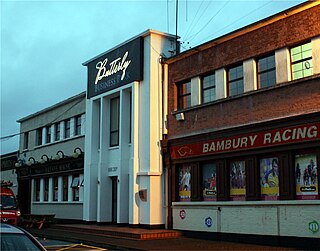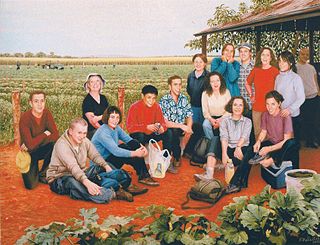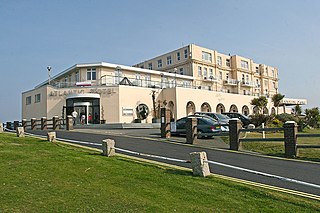
Newquay is a town on the north coast in Cornwall, England, United Kingdom. It is a civil parish, seaside resort, regional centre for aerospace industries with an airport and a spaceport, and a fishing port on the North Atlantic coast of Cornwall, approximately 12 miles (19 km) north of Truro and 20 miles (32 km) west of Bodmin.

The Happy Land fire was an act of arson that killed 87 people on March 25, 1990, in the Bronx in New York City, United States. The 87 victims were trapped in the unlicensed Happy Land social club, located at 1959 Southern Boulevard in the West Farms section of the Bronx. Most of the victims were young Hondurans celebrating Carnival, many of them part of the Garifuna American community. Cuban refugee Julio González, whose former girlfriend was employed at the club, was arrested soon afterward and ultimately convicted of arson and murder.

The Stardust fire was a fatal fire which took place at the Stardust nightclub in Artane, Dublin, Ireland, in the early hours of 14 February 1981. More than 800 people were attending a disco there, of whom 48 died and 214 were injured as a result of the fire; in later years suicides of survivors and family members were also linked to the event.

The New Cross house fire was a fire that occurred during a party at a house in New Cross, south-east London, in the early hours of Sunday, 18 January 1981. The blaze killed 13 young black people aged between 14 and 22, and one survivor killed himself two years later.

The London Fire Brigade (LFB) is the fire and rescue service for London, the capital of the United Kingdom. It was formed by the Metropolitan Fire Brigade Act 1865, under the leadership of superintendent Eyre Massey Shaw. It has 5,992 staff, including 5,096 operational firefighters and officers based at 102 fire stations.
In English law, Irish law and Northern Irish law, unlawful killing is a verdict that can be returned by an inquest in England and Wales and Ireland when someone has been killed by one or more unknown persons. The verdict means that the killing was done without lawful excuse and in breach of criminal law. This includes murder, manslaughter, infanticide and causing death by dangerous driving. A verdict of unlawful killing generally leads to a police investigation, with the aim of gathering sufficient evidence to identify, charge and prosecute those responsible.

Devon and Somerset Fire and Rescue Service (DSFRS) is the statutory fire and rescue service covering the counties Devon and Somerset in South West England – an area of 3,924 square miles (10,160 km2). It serves a population of 1.75 million, and is the fifth largest fire and rescue service in the United Kingdom.

Humberside Fire and Rescue Service (HFRS) is the statutory fire and rescue service covering the area of what was the county of Humberside (1974–1996), but now consists of the unitary authorities of East Riding of Yorkshire, Kingston upon Hull, North Lincolnshire and North East Lincolnshire in northern England.

The Headland Hotel is a Grade II listed building located in Newquay, Cornwall, England, United Kingdom. It was opened in June 1900 and is built on a prominent position overlooking Fistral Beach and Towan Head.

Cornwall Fire and Rescue Service is the statutory fire and rescue service covering Cornwall, England. As of April 2019, the service employs over 400 retained firefighters, 203 full-time firefighters, plus 170 support and administrative staff. Created under the Fire Services Act 1947 as "Cornwall County Fire Brigade", the name changed to "Cornwall Fire and Rescue Service" on 1 October 2009.

Norfolk Fire and Rescue Service (NFRS) is the statutory fire and rescue service for the county of Norfolk in the east of England. The county consists of around 870,100 people, covering the 4th largest area in England with 2,074 square miles including 200 miles of inland waterways, 90 miles of coastline and 6,125 miles of roads. The county city is Norwich with other major towns including Great Yarmouth, King's Lynn and Thetford. Norfolk has one of the 20 Urban Search and Rescue teams across England and Wales which were set up in response to the 9/11 attacks. The teams, including Norfolk, have the capacity to deal with two simultaneous incidents across the UK.

The Childers Palace Backpackers Hostel fire on 23 June 2000 killed 15 backpackers – nine women and six men – at the former Palace Hotel in the town of Childers, Queensland, Australia, which had been converted into a backpacker hostel. Robert Paul Long was arrested for lighting the fire and charged with two counts of murder and one count of arson. He was later sentenced to life imprisonment.

Western Greyhound was a bus operator based in Summercourt, near Newquay, which operated services in Cornwall and Devon from January 1998 until March 2015.
On 5 February 2019, a fire killed at least 10 people and injured at least 36 others at an apartment block on Rue Erlanger in Paris' 16th arrondissement, France, making it the deadliest fire in the French capital since 2005.

The Hotel Victoria is in Newquay, Cornwall, United Kingdom and is near the cliffs above the Great Western Beach. The Hotel first opened in June 1899.

The Atlantic Hotel is in Newquay, Cornwall, United Kingdom. It was first opened in July 1892 and occupies a prominent position on the shore, with views of the Atlantic Ocean & the North Cornish coast.

On 2 January 2023, a fire broke out at New County Hotel in Perth, Scotland. It killed three people and one dog, and injured eleven other people.


















